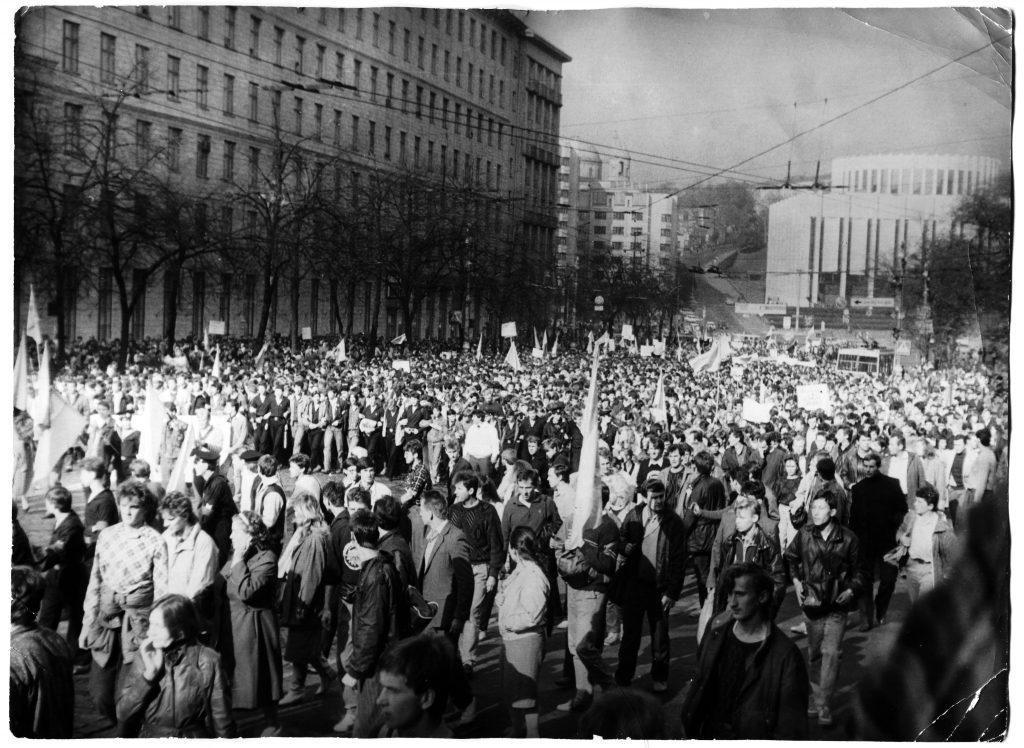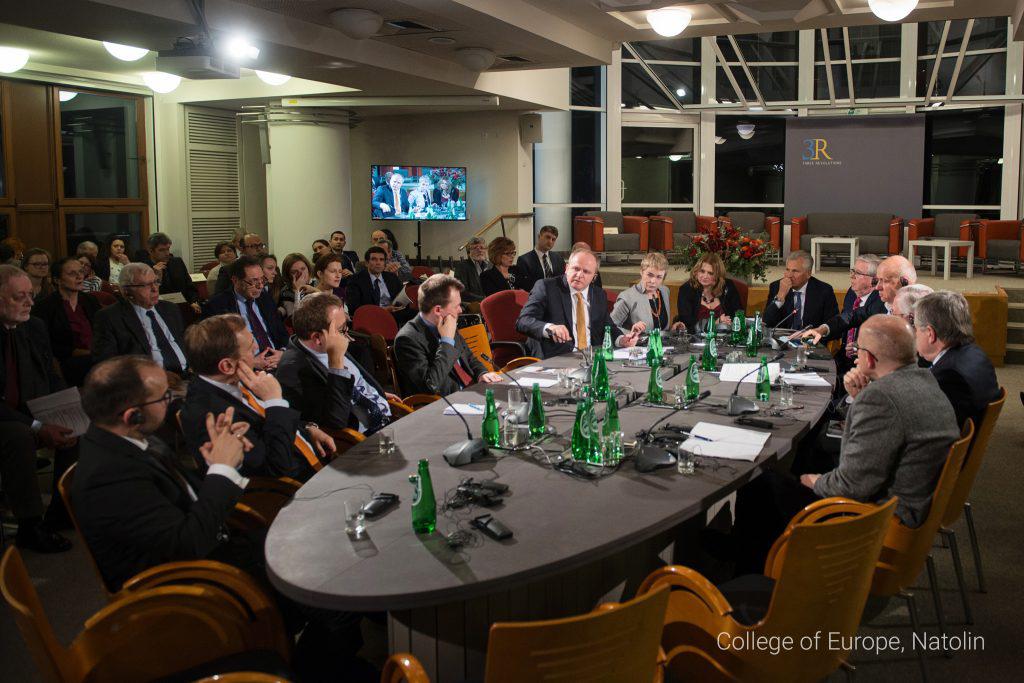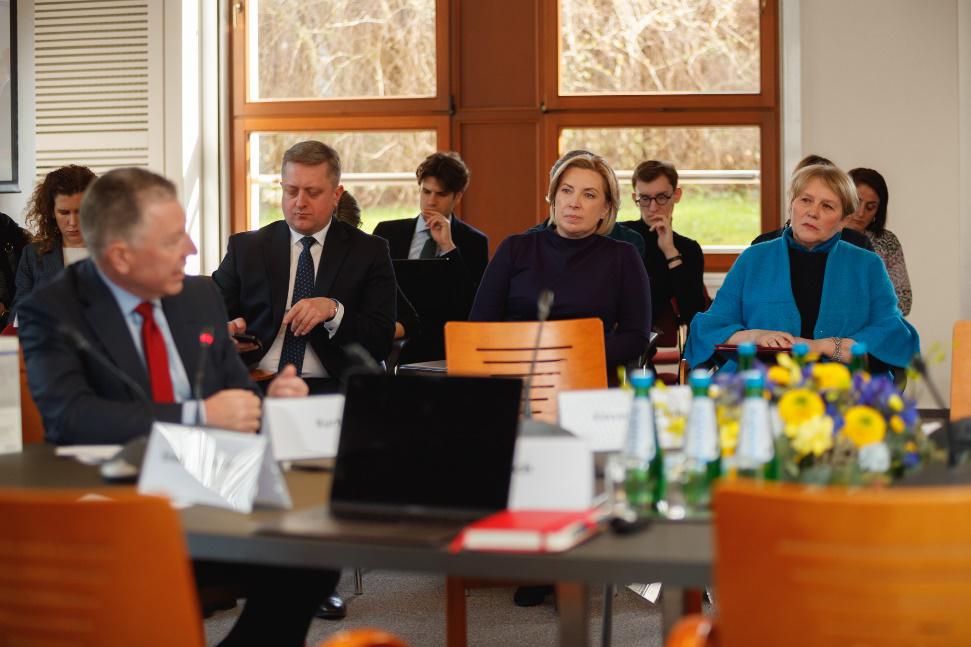About the project
The College of Europe in Natolin carried out its flagship “Three Revolutions” (3R) project between 2016 and 2024. Hosted within the European Civilization Chair, the project involved dozens of leading academics, experts, politicians, diplomats, soldiers, and clergymen, who participated in or closely observed the making of contemporary Ukrainian history.
In the first phase of the project (2016-2022) 3R researchers analysed the political and social developments in Ukraine in the light of the three most significant protests that occurred in Ukraine since 1990: the Revolution on Granite (1990), the Orange Revolution (2004-2005), and the Euromaidan/ Revolution of Dignity (2013-2014).
During this phase the analysis was centred on the three breakthrough moments (revolutions) which showed the continued process of political nation-building in Ukraine (that is, the construction of modern Ukraine) and a parallel gradual detachment from the Soviet heritage and the Kremlin’s influence (the dismantling of the Soviet world).

The use of the methods of oral history resulted in the collection of 100 verbal testimonies from direct participants in all three revolutionary events in Ukraine. The interviews were completed by testimonies given during three historical workshops which were based on the Cold War Project model and organized in 2017 at the College of Europe in Natolin where the first international symposium Three Revolutions – Portraits of Ukraine was held. This unique gathering of participants in all three revolutionary events, as well as experts and international observers, allowed the 3R researchers to verify their hypotheses, which assumed continuity between the three revolutions, and enrich their analyses.
The research findings were verified again during the second international symposium: Revolution, War and their Consequences and third international symposium: Five years after the Maidan: post-revolution evolution, which were held at the Natolin campus in 2018 and 2019 respectively. These two meetings of high-level experts and politicians involved in Ukrainian political and social developments focused on the short- and long-term consequences of the three revolutions. Discussions during the symposia also focused on external factors, including the Russian threat, which – it was concluded – had a significant impact on Ukraine’s social and political mobilization after 1990.

The principal outcomes of the first stage of the project included a three-volume publication, with the first two volumes published in 2019. The first volume, titled Three Revolutions: Mobilization and Change in Contemporary Ukraine I: Theoretical Aspects and Analyses on Religion, Memory, and Identity, edited by Paweł Kowal, Georges Mink, and Iwona Reichardt, includes articles by international experts and scholars on topics related to the revolutionary events that have unfolded in Ukraine since 1990. The second volume, titled Three Revolutions: Mobilization and Change in Contemporary Ukraine II: An Oral History of the Revolution on Granite, Orange Revolution, and Revolution of Dignity, edited by Paweł Kowal, Georges Mink, Iwona Reichardt, and Adam Reichardt, presents interviews with participants and eyewitnesses of the events in Ukraine and documents a series of workshop discussions conducted at the symposium held in 2017.
The third volume, published in 2022, Three Revolutions: Mobilization and Change in Contemporary Ukraine III: Archival Records and Historical Sources, edited by Paweł Kowal, Iwona Reichardt, and Kateryna Pryshchepa, provides scholars with original historical sources, including telegrams and KGB reports, from the time of the Revolution on Granite.
All three volumes were presented to the public at international conferences and academic conventions where they were discussed with scholars and subject specialists. The publications, which have been reviewed in academic and non-academic journals alike, are now available in university libraries around the world.
Since February 2022, with the start of Russia’s full-scale invasion of Ukraine, the findings of the 3R project have provoked new research questions: Had there been no revolutions in Ukraine, would there have been a war? Had there been no revolutions in Ukraine, would there be a Ukraine at all?

To answer them, the 3R project entered into its second phase, which because of the new context, both within Ukraine and internationally, required a new approach. Thus, this time the 3R research focused on analysing both the resistance of Ukrainian society to the Russian aggression, pointing to the connection between this experience and the earlier revolutions, and the international response to Russia’s aggression and violations of international law.
Reflecting on the earlier findings, a new research hypothesis was formulated: the long end of the Soviet world. This is observed to have been taking place in Ukraine and it will determine the future of the entire post-Soviet space. In this process, the experience of the three revolutions has and will continue to be of crucial importance.
The final outcomes of the project include the fourth international symposium Ten Years of Russia’s War against Ukraine: The Long End of the Post-Soviet Era held on 26 March 2024 at the College of Europe in Natolin. During this gathering a workshop with direct participants of the events was again organised. Oral history testimonies of foreign diplomats who were in Kyiv at the time of the outbreak of the full-scale war were collected and confronted with expert analyses.
These and other findings of the 3R project have been included in the 3R project’s last publication The End of the Soviet World? Essays on Post-Communist Political and Social Change which was edited by Georges Mink and Iwona Reichardt and published in 2025.